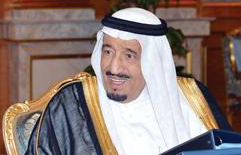 Jeddah, Sep 10: Foreign mothers of Saudi children will be given permanent residence in the Kingdom without sponsors, the Council of Ministers said on Monday. They will also receive educational and health services like other Saudis.
Jeddah, Sep 10: Foreign mothers of Saudi children will be given permanent residence in the Kingdom without sponsors, the Council of Ministers said on Monday. They will also receive educational and health services like other Saudis.
The Cabinet, chaired by Crown Prince Salman, deputy premier and minister of defense, made this important decision upon the recommendation of Foreign Minister Prince Saud Al-Faisal.
The decision was aimed at encouraging non-Saudi wives of Saudis to stay in the Kingdom with their children. The Cabinet said that the state shall bear the woman’s residence fees.
“She shall be allowed to work for others in the private sector and she shall be considered part of Saudization process,” said Culture and Information Minister Abdul Aziz Khoja.
The Cabinet deleted Para 3 of the Cabinet's decision No. 1215 dated 8/11/1392 regarding non-Saudi widows with Saudi children, which stipulates that her son “be her sponsor according to Iqama regulations.”
It also deleted Para 5 of the same decision, which states that “the sponsor undertakes paying living expenses if she cannot keep a job due to legal objection.” The non-Saudi mother of Saudi children shall be treated as a Saudi national in terms of general and university education, as well as medical treatment in government hospitals, the Cabinet said.
Saudis and expatriates have applauded the decision, saying it would solve problems facing many Saudi families.
“This decision should have been taken a long time ago,” said Mohammed Badahdah, assistant secretary-general of the World Assembly of Muslim Youth.
“A foreign mother of Saudi children should acquire permanent residency by default in order to bring peace of mind and stability to the family,” he told Arab News.“It is the right of the mother to stay with her children.”
Badahdah said that granting citizenship to these women should be decided by higher authorities, adding that Saudi Arabia has temporarily stopped giving citizenship to foreigners. “They used to consider applications of people who have gained the required points in terms of stay, education and family relations with Saudis,” he said.
Abdullah Bajubair thanked the government for the humane decision. He requested the king to consider granting citizenship to those who are born and brought up in the Kingdom and have lived in the country for several years.





Comments
Add new comment